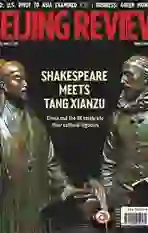Shared Legacy
2016-06-08
While dramatists Tang Xianzu and William Shakespeare lived and worked on two different continents, they shared a literary legacy. As this year marks the 400th year since their passing, a series of cultural events are being held to commemorate the literary masters.
Several commemorative activities were held in April in Shakespeares hometown, Stratford-upon-Avon, by the Chinese Peoples Association for Friendship With Foreign Countries and Jiangxi Province, where Tang was born. The “Shakespeare Lives” initiative was launched in January by the British Council and the GREAT Britain campaign, a governmental program aiming to promote the UK internationally as a great place to visit, study and do business. This August, the Suzhou Kunqu Opera House will stage performances of Tangs masterpiece Dream in Peony Pavilion in London, and the Zhejiang Kunqu Opera Troupe will take part in the Edinburgh Festival Fringe.
“National Theater Live”—an initiative by the Royal National Theater in London that showcases performances in movie theaters, cinemas and arts centers around the world—will expand to more cities in China. Under this program, Chinese audiences have enjoyed classic plays including Hamlet, performed by British actor Benedict Cumberbatch.
Shakespeare first appeared in Chinese publications in the late 1830s. But he did not receive much attention until a century later when his works were translated by writers and translators, such as Liang Shiqiu and Zhu Shenghao.
The Peoples Literature Publishing House first set out to publish Shakespeares complete works in 1964, but was ultimately unable to complete the project until 1978 after the end of the “cultural revolution” (1966-76). It consisted of 37 of Shakespeares plays and all of his poems, becoming the first collection of the complete works of a foreign author to be published in China.
Several notable translators, including Zhu, worked on translating Shakespeares works over the course of their careers. The latest edition of his complete works was translated by 23 scholars and translators and published by the Foreign Language Teaching and Research Press in April.
In a speech delivered by President Xi Jinping during his visit to the UK in October last year, he said Tang was Shakespeares Eastern counterpart and called on China and the UK to commemorate the two literary giants in order to promote people-to-people exchanges and mutual understanding.
In this spirit, events celebrating the two dramatists legacies have drawn attention from government agencies, cultural institutions and ordinary people in China and the UK, greatly boosting crosscultural exchanges.
